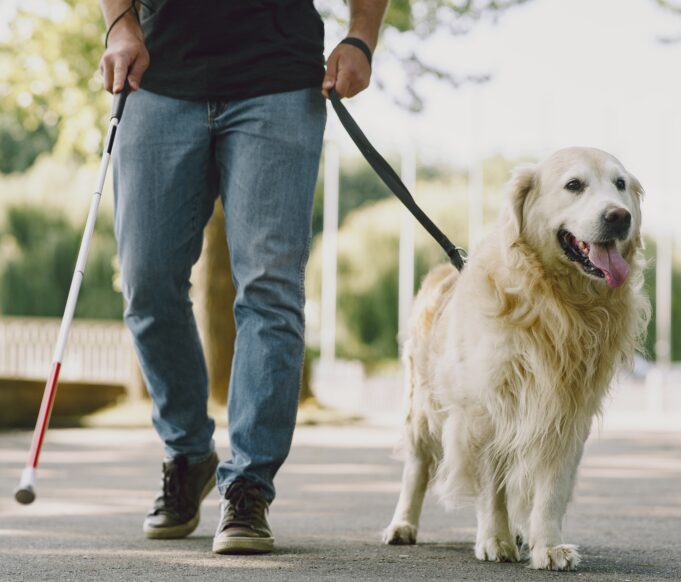Written by Denise
Homeowners associations often have rules restricting pets. But, do these rules apply to assistance animals in HOA communities? What counts as an assistance animal anyway?
Applicable Laws for Assistance Animals in HOA Communities
Pet ownership can be a very rewarding and loving experience, but it is not always an option for homeowners living in HOAs. Homeowners associations are known for imposing a variety of rules designed to maintain the community’s appeal and preserve property values. In many HOAs, there are rules pertaining to pets. Some of the most common pet policies include restricting the number of pets owners can keep, what types of pets are allowed, and whether or not owners can bring them to common facilities. Some associations even have a strict no-pets policy.
But, the conversation takes a drastic shift when the subject of HOA assistance animals comes up. Assistance animals are not pets, so not all of an association’s rules will apply to them. Assistance animals help people with disabilities, and there are a handful of laws that protect this right. The big ones are the federal Fair Housing Act (FHA) and the Americans With Disabilities Act (ADA). However, there are also several laws on a state or local level that govern assistance animals in homeowners and condo associations.
To avoid potential liability, homeowners associations should carefully review all laws that apply to ADA and FHA assistance animals. Associations should also make reasonable accommodations when requested by a person with a disability.
Types of Assistance Animals – There are three kinds of assistance animals: service animals, emotional support animals, and therapy animals.
Service animals are assistance animals that are specifically trained to carry out tasks for persons with physical disabilities.
Emotional support animals are assistance animals that provide comfort for persons with mental health problems.
Therapy animals are assistance animals that offer psychological or physiological benefits to a person or groups of people in a clinical setting.
What Qualifies as an Assistance Animal?
Generally, an assistance animal is an animal that falls under one of the three categories described above. However, there are limitations when it comes to the species of animal.
Assistance animals in an HOA should be animals that are commonly kept in households. These include dogs, cats, hamsters, fish, small birds, turtles, and rabbits. Basically, any small and domesticated animal that people conventionally keep as household pets.
According to the U.S. Department of Housing and Urban Development (HUD), animals bred for commercial purposes don’t fall under this umbrella. These include barnyard animals, kangaroos, monkeys, and reptiles (apart from turtles).
If a homeowner requests a reasonable accommodation to keep a non-domesticated assistance animal or one that isn’t a common household pet, the HOA may deny the request. But, there are special cases. If the homeowner demonstrates a therapeutic need for the animal that’s related to their disability, then the HOA should provide reasonable accommodation. The homeowner requesting the accommodation is encouraged to provide documentation from a health care professional supporting the need for that specific type of animal.
Observable and Non-Observable Disabilities
The federal FHA defines a disability as an impairment of the physical or mental nature that considerably prevents a person from participating in or completing one or more major life activities. Some disabilities are readily apparent, so it’s easy to confirm them. These are known as observable disabilities.
Examples of observable disabilities include:
-Blindness
-Deafness
-Mobility impairments
-Intellectual impairments
-Neurological impairments (epilepsy, stroke, cerebral palsy, Parkinson’s disease, etc.)
-Mental illness
On the other hand, there are also disabilities (non-observable) that are invisible to the eye. In such cases, it is difficult to gauge whether or not a homeowner’s request has any basis. To proceed, HOAs can request more information from the homeowner. These include information concerning the disability as well as the need for the assistance animal in relation to the disability. But, HOAs should tread lightly. It is not acceptable to ask a person to provide their diagnosis.
Requesting Supporting Documentation
Community associations can also ask for supporting documentation to substantiate the request if the disability is not readily observable. Homeowners can get these licenses, certifications, and registrations from a number of websites online. All they have to do is answer a few questions and do a brief interview. These websites, though, also charge a fee for the service.
Of course, according to HUD, documentation from such websites are not always reliable. As such, homeowners can opt to secure documentation from licensed health care professionals. Many of these professionals offer their services online, too. Even a simple note confirming the person’s disability and need for assistance animals in homeowners associations will do.
Do the Rules Apply to Assistance Animals in HOA Communities?
Homeowners associations usually have common areas and amenities that residents can use. Some may have rules prohibiting pets from entering such spaces. But, assistance animals in community associations are not considered pets. In this case, a homeowner with an assistance animal can request their HOA for reasonable accommodation.
Of course, this doesn’t mean that none of the rules should apply to assistance animals. Owners must still maintain control over the assistance animal at all times. This means keeping them on a leash or keeping them under control with the help of voice commands and signals. If the owner can no longer control the assistance animal, the HOA may ask to remove it from the premises.
Additionally, both the FHA and ADA give associations the right to deny reasonable accommodation requests if the animal is a threat to other people’s safety.
A Checklist for Granting Reasonable Accommodation
Navigating reasonable accommodation requests can come as a challenge. Here is a checklist that will help HOAs evaluate such requests:
The resident has submitted a request for reasonable accommodation.
The resident has an observable disability or the resident has provided information concerning their disability/need for an assistance animal.
Information has been provided by the resident supporting that the assistance animal performs tasks or provides emotional support in relation to the resident’s disability.
The assistance animal is a domesticated animal commonly kept in households.
If the requesting party meets the above conditions, then the association should grant reasonable accommodation.
A Happy and Safe Community for Everyone
It is not uncommon for homeowners to keep assistance animals in HOA communities. Associations should take careful and proper steps when assessing such requests for reasonable accommodation. In doing so, HOAs can stay away from potential liability and keep residents happy at the same time.
Shared from Clark Simmon Miller











